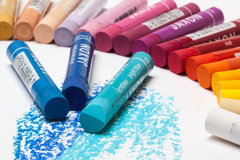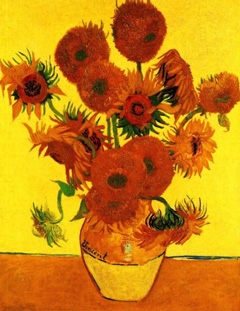| ART THERAPY |
 |
|
Anyone who creates art knows the relief, release, and relaxation that can arise from shaping something beautiful by hand. Art therapy uses this truth to encourage healing in guided sessions used as treatments for countless concerns, from medical rehabilitation to general counselling.
This article discusses the field of art history - what it is, it's history, many uses, and how one becomes a professional art therapist.
|
SUMMARY
| WHAT IS IT |
THE HISTORY |
TREATMENT |
TRAINING |
| Art therapy is the use of creative expression to treat or aid in the management of cancer, PTSD, depression, physical pain, and many other concerns. |
Though art has always sought to express emotion, as a profession art therapy developed in the 1940s, simultaneously in Britain and the United States. |
Art therapists may work in nursing homes, hospitals, clinics, schools, prisons, or even corporate offices. |
In order to qualify for the art therapy masters program, a candidate must display knowledge and skill in both art and psychology. |
|
| WHAT IS ART THERAPY?
|
 |
|
Art therapy, also called Creative or Expressive Arts Therapy, is the use of creative expression to aid in and improve mental, physical, or emotional well-being of patients. Though drawing the painting are the practices most often thought of, therapy can be in the form of sculpting, theatrical expression, or any number of other artistic pursuits.
One of the reasons art therapy is thought to be successful is that it provides an alternative method of self-expression to words and language. Often, people find themselves unable to make their point or correctly express their feelings because they are limited by their vocabulary. Art offers a visual outlet through which they can share their thoughts and feelings.
Art therapy is utilized in many different fields, as discussed in a following section. Within each area, it has been useful in:
- dealing with stress
- managing aberrant behavior
- recognizing latent feelings
- improving self-esteem
- increasing coping skills
- improving cognitive function
- and increasing self-awareness and awareness of others
Art therapists must be educated in both art and psychology. With their training, they may simply guide patients through planned artistic exercises, but most practice encouraging their patients to recognize the underlying significance of the art they create while in a session. Depending on the circumstances, art therapists may work along in a private practice, or in conjunction with other medical professionals - doctors, psychologists, physiotherapists, and so on.
Diagnostic Drawing Series
Developed by two art therapists in 1982, the DDS is an art interview administered to patients in order to assess the level and style of treatment they require. The diagnosis is based on the structure of the ensuing artwork, not the images depicted.
The DDS formula is strictly adhered to to ensure as many factors as possible are equalized across the board. The subject is seated at a table and given chalk pastels and a sheet of 12x18" paper. They are asked to create a drawing. The drawing is then rated based on seven criteria:
- color (how many are used)
- enclosure
- line length
- space usage
- integration
- movement
- placement on page
|

Painting to express emotion

The DDS method uses pastels
|
| HISTORY OF ART THERAPY
|
 |
|
For centuries, art has been used as a way to share ideas and represent or evoke emotion. In that way, it has always been a type of therapy in and of itself. Art therapy did not develop as a profession, however, until the mid 20th century. Reports and articles by the earliest art therapists identified the fields of rehabilitation, early childhood education, art education, and the philosophy of aesthetic.
The term "art therapy" was coined in the 1940s by a British artist named Adrian Hill. He used art to help in his recovery from a serious illness, and encouraged the other patients in the facility to join him. Carrying on with the methods he discussed, the artist Edward Adamson began incorporating art therapy into his work with long term care patients in mental facilities.
This style of therapy was introduced in America around the same time. Psychologist Margaret Naumburg used the term to describe her use of art to release her patients' unconscious feelings, by encouraging free association in their drawings. She would then encourage the patient to analyze and interpret their creation.
Austrian artist Edith Kramer, who came to the US in the 1940s, was also a pioneer for art therapy. She founded the art therapy graduate program at New York University, and taught the field both there and at George Washington University in D.C..
|

Impressionism depicted the artist's feelings, in that place, at that moment
|
| TREATMENT WITH ART THERAPY
|
 |
|
Art therapy can be used in the treatment of almost any disease, disorder, or trauma circumstance. The following list outlines only some of the many possibilities for the use of art therapy. Depending on the situation and the requirements of the patient, the therapy may be individual or administered in a group setting.
- People with critical illnesses such as cancer use art to create an identity outside of their illness. Their practice may be directed by a therapist, or self-guided.
- Victims of disaster and traumatic experience may be enrolled in art therapy, where they are encouraged to create art that responds to their feelings surrounding the event.
- Children suffering from a death in the family are encouraged to create art to stimulate "the conscious and unconscious expression of the mourning process". Alternately, some therapists may choose to use art as a distraction from bereavement, rather than a direct way to work through it.
- Art therapy may be used in the rehabilitation process for people in mental health facilities and prisons.
- It is known to be a helpful form of therapy for war veterans and others dealing with Post Traumatic Stress Disorder.
- Therapists may work with individuals of all ages, in community outreach programs, schools, nursing homes, and even corporate environments.
|

Sculpture may be used in art therapy sessions, as well.
|
| BECOMING AN ART THERAPIST
|
 |
|
Those who are successful in becoming art therapists require not just a strong background in studio art, but also a good understanding of human development, psychological theory, and various spiritual, cultural, and artistic tradition, as well as a foundation of clinical practice.
In order to be accepted into an art therapy masters program, a candidate must have:
- A bachelor's degree in art education, art, psychology, or a similar field
- a certain number of hours of studio art
- proven proficiency in painting, drawing, etc, usually illustrated by a portfolio
- a certain number of hours of psychology study and practical application
- recommendation letters
- and a personal statement
|

Becoming an art therapist requires a lot of study
|
| THE BENEFITS OF VIEWING ART
|
 |
|
Research has shown that images of landscapes and water scenes tend to be calming to viewers, while the ambiguity of abstract art energizes or makes viewers feel anxious.
But whatever style of artwork you prefer to gaze at, there's little question that decorating your home with your favorite colors, designs, and representative pieces will make you happier overall. Looking at beautiful art - that is, art you think is beautiful - stimulates your imagination and improves observation (as does creating it).
By decorating your place - be it home, office, car, or anywhere else you spend a lot of time - with artwork, you are assisting your brain in its quest for happiness and bliss. Take time to figure out what you like, and fill, or subtly accent, your living space with that. Choose artwork that makes you smile, or brings back a fond memory of when you bought it, or when you visited the landscape it depicts.
They say we'll be happier if we spend out money on experiences, rather than things, but art falls somewhere closer to the former. If you recall sights, smells, sounds, and feelings everytime you look at that piece, it's serving as an experience each and every day.
At KeenART Media, we can help you fill your home with beauty.
We have a large selection of classic artist paintings available to be printed, with high quality, archival Giclée inks, on real canvas or fine art paper.
You can have your own original paintings reproduced (we can stretch them for you) to hang in your home, or to give as gifts, to share that personal joy with loved ones. We also offer more than 400 beautiful wood picture frame mouldings which can be cut to any size and fitted to your favorite pieces still awaiting display.
|

Van Gogh's "Still Life Vase with Fifteen Sunflowers"
|
|
At KeenART Media, we offer our own version of art therapy by creating beautiful reproductions of original artwork on canvas, fine art paper, and fabric. You can browse our selection and place your order by visiting our Product Pricing main page.
If you have questions about any of our services or products, don't hesitate to contact us. Our knowledgeable staff is always happy to assist with answers, advice, or suggestions.
Research on this topic was primarily facilitated by Wikipedia's Art Therapy entry.
|
|
© 2002-2026 - KeenART Media Ltd.
|
|
| |
|
